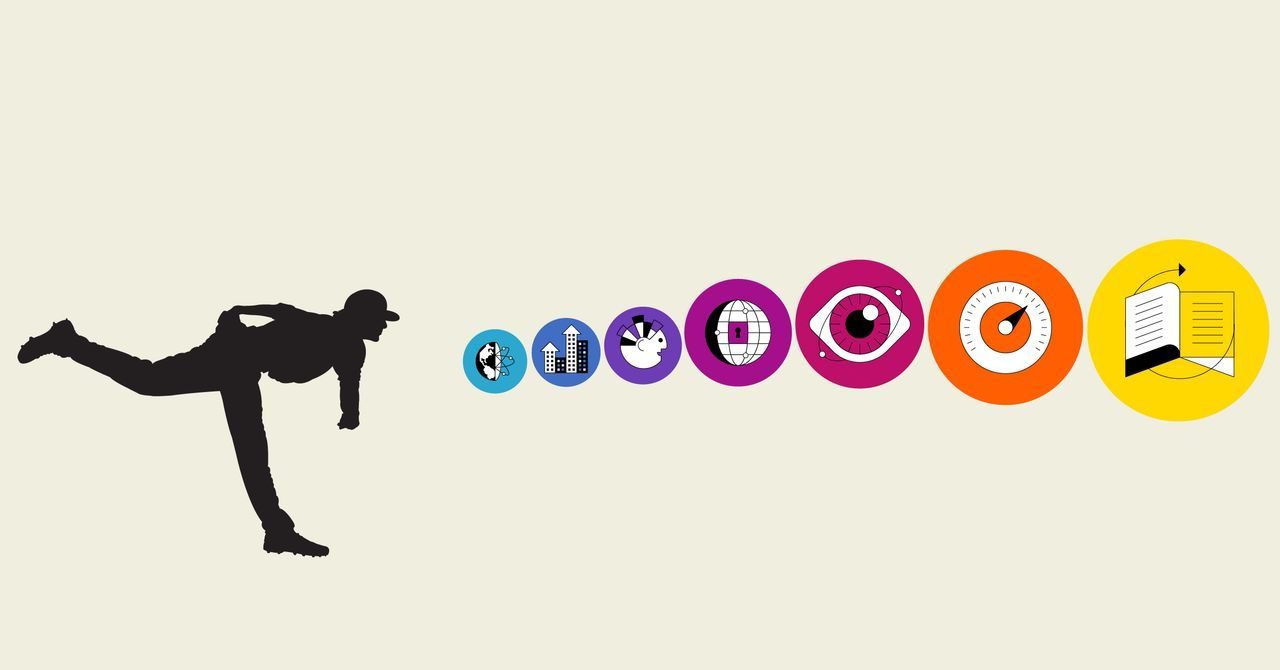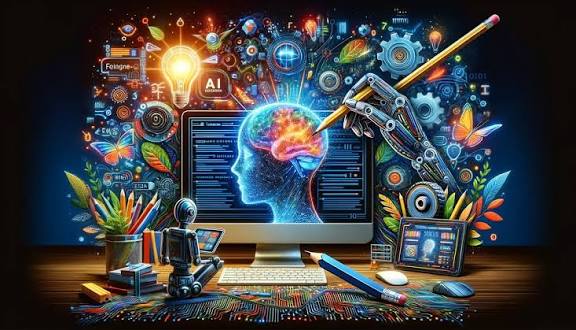
Wired – In-depth tech and culture journalism.
The rapid advancement of technology has revolutionized communication, work, culture, and ethics, creating a complex intersection of innovation and societal change. From the rise of AI and automation to the ethical concerns of data privacy, blockchain, and environmental sustainability, technology presents both opportunities for progress and challenges that require careful management, balance, and thoughtful regulation to ensure it benefits humanity in a responsible and inclusive manner.
✨ Raghav Jain

Wired – In-Depth Tech and Culture Journalism
Wired, founded in 1993, is an American magazine and online publication that covers the intersection of technology, culture, business, science, and design. Over the years, it has grown into one of the most influential and respected outlets for in-depth journalism, offering a unique blend of insightful commentary, investigative reporting, and thought-provoking articles. In this article, we explore the role that Wired plays in tech and culture journalism, its evolution, its impact on media, and the future of technology-driven reporting.
The Origins of Wired
Wired was founded by Louis Rossetto and Jane Metcalfe, who sought to create a publication that would address the rapid technological advancements of the late 20th century. The magazine emerged during a time when technology was beginning to reshape every facet of life—from business and culture to politics and society. In the early 1990s, the internet was starting to gain traction, the dot-com boom was on the horizon, and companies like Apple, Microsoft, and Netscape were pushing the boundaries of what was possible with personal computing.
Wired's mission was to provide a platform that could cover these emerging technologies in a way that was both accessible and intellectually stimulating. Unlike traditional technology publications that were focused on hardware specs and industry news, Wired sought to take a broader view—exploring the social, economic, and cultural implications of technology.
The first issue of Wired, published in March 1993, featured a cover story on the advent of the World Wide Web, and it set the tone for the magazine's future. It featured a mix of cutting-edge technology journalism, cultural critique, and long-form storytelling. The article was written with a sense of excitement, as it captured the anticipation and potential of the internet in a way that few others had at the time.
Evolution of Wired
Since its inception, Wired has undergone significant changes, both in terms of its content and its format. Early on, the magazine was known for its bold design choices, which included colorful graphics, unusual layouts, and a modern aesthetic that set it apart from traditional tech magazines. Its design was meant to reflect the dynamic and rapidly changing world of technology.
In the late 1990s and early 2000s, Wired's coverage expanded beyond just technology to include subjects like business, science, entertainment, and politics. The magazine became known for its high-quality investigative journalism, and it often published in-depth articles that were not available anywhere else. Its reporting on topics such as the rise of Silicon Valley, the dot-com crash, the ethical questions surrounding artificial intelligence, and the culture of innovation helped shape public discourse on technology.
In the mid-2000s, as the internet began to shift the way people consumed media, Wired transitioned into the digital age with an online presence. The website, wired.com, launched in 1996, and by the early 2010s, it had become an essential platform for news and commentary on the digital world. Today, Wired is as much an online entity as it is a print publication, with millions of readers across the globe.
However, what truly sets Wired apart from many other tech publications is its commitment to long-form journalism. While many tech outlets focus on breaking news, Wired has consistently invested in deeper, more thoughtful pieces that dive into the complexity of technological issues. The magazine’s in-depth features explore not just the how of technology but the why—the underlying forces, trends, and societal consequences of tech.
Wired's Approach to Tech Journalism
Wired’s journalism is distinguished by its in-depth approach to technology. Rather than offering surface-level analysis, the magazine aims to contextualize technological advancements within broader social, political, and economic frameworks. This allows readers to understand not only what is happening in the tech world but why it matters.
Investigative Reporting
One of the hallmarks of Wired’s approach to journalism is its investigative reporting. The magazine has consistently published stories that examine the impact of technology on society, from the rise of social media giants like Facebook to the ethical issues surrounding artificial intelligence. Wired often breaks stories that reveal hidden aspects of the tech industry, such as the ways that companies collect and exploit user data or how new technologies could be used for surveillance.
In 2017, Wired published an investigative report on the growing use of facial recognition technology in public spaces. The piece examined how tech companies and government agencies were collecting data on citizens without their knowledge or consent, raising serious concerns about privacy and civil liberties. This type of investigative journalism is one of the reasons why Wired has become a trusted source of information on the ethical implications of new technologies.
Cultural Commentary
Wired is also known for its cultural commentary, which provides an intellectual framework for understanding the societal changes driven by technological advancements. The magazine’s writers often explore how tech influences everything from politics to art, identity, and human relationships. Articles frequently delve into the cultural shifts that occur as new technologies become ubiquitous, offering insights into how these changes affect our daily lives.
For example, the rise of social media and the proliferation of smartphones have had profound effects on human interaction, mental health, and privacy. Wired has published numerous articles that reflect on these changes, offering nuanced perspectives that go beyond the typical “good or bad” analysis. Instead of simply celebrating or condemning technology, the magazine explores its complexities and contradictions.
In-Depth Analysis of Emerging Trends
Wired has a reputation for being ahead of the curve when it comes to identifying emerging technological trends. Whether it’s artificial intelligence, blockchain, cryptocurrency, or the future of space exploration, the magazine provides in-depth analysis of how these technologies could shape the future. Wired doesn’t just report on the latest tech developments; it offers thoughtful analysis of the potential risks, rewards, and societal implications.
For example, in 2015, Wired published a cover story on the promise and perils of artificial intelligence. The article explored both the potential for AI to revolutionize industries like healthcare and transportation, as well as the existential risks posed by autonomous machines. This kind of long-form, speculative journalism is a hallmark of Wired’s approach and demonstrates the magazine’s commitment to exploring the far-reaching consequences of technological innovation.
Wired's Influence on Tech Journalism
Wired has had a significant influence on the world of tech journalism, both in terms of its approach to reporting and the standards it has set for the industry. Over the years, many other tech outlets have tried to emulate Wired’s formula of combining investigative journalism, cultural analysis, and in-depth reporting. In many ways, Wired set the template for how technology journalism should be done in the digital age.
The magazine's ability to mix investigative reporting with cultural critique has made it a leader in the industry. Many of the most respected voices in tech journalism have written for Wired, and its articles often serve as a touchstone for other media outlets covering the same topics. Additionally, Wired’s commitment to long-form journalism has helped elevate the standards of the tech media industry. In an era where much of the media landscape is dominated by clickbait and short-form content, Wired has remained committed to producing thoughtful, high-quality journalism.
Moreover, Wired’s role as a cultural commentator has extended beyond the tech world. The magazine has been instrumental in shaping how people think about technology’s role in society, helping to frame public discussions around issues like privacy, artificial intelligence, and surveillance. As technology continues to play an ever-growing role in our lives, Wired remains at the forefront of conversations about how these innovations should be understood and regulated.
Wired in the Age of Digital Media
In the era of digital media, where information is consumed quickly and often in bite-sized portions, Wired has managed to maintain its reputation as a serious publication. The transition from print to digital hasn’t been without challenges, but Wired’s ability to adapt has been key to its continued success.
The magazine has embraced digital storytelling formats, including podcasts, video series, and interactive online content. This has allowed Wired to reach a broader audience while maintaining its focus on high-quality journalism. Additionally, the magazine has expanded its online presence through social media platforms, where it shares breaking news and engages with readers in real-time.
However, the transition to the digital age has also forced Wired to confront the challenges of online publishing, including the pressures of maintaining ad revenue and battling misinformation. As with many traditional media outlets, Wired has had to adapt to the changing landscape of digital media, but it has managed to do so without sacrificing the quality of its journalism.
The concept of technological advancement and its impact on modern society is one of the most pivotal and multifaceted discussions of the 21st century, as it encompasses everything from personal devices to societal structures, deeply influencing the way we live, interact, and understand the world around us, creating a dynamic interplay between innovation, economy, ethics, and culture. At the heart of this phenomenon lies the rapid development of digital technologies, which have reshaped traditional notions of communication, education, work, and even human identity, forcing society to reckon with both the positive and negative consequences of these changes. With the rise of the internet, smartphones, and artificial intelligence (AI), we have seen a complete transformation of how information is disseminated, consumed, and used in our daily lives. The internet, for example, has bridged vast geographical divides, enabling instantaneous global communication and access to a virtually limitless repository of information, allowing individuals to connect with others across borders and cultures. Social media platforms have similarly revolutionized social interaction, allowing people to maintain relationships and share experiences in ways that were previously unimaginable, yet they have also introduced complex issues such as privacy concerns, cyberbullying, and the erosion of face-to-face communication. Similarly, artificial intelligence, which is now increasingly integrated into industries ranging from healthcare to transportation, promises to improve efficiency, reduce human error, and solve complex problems, but it also raises questions about job displacement, the ethics of automation, and the potential for AI to exacerbate inequalities in society. Moreover, the emergence of data as a commodity, with tech giants accumulating vast amounts of personal information, has sparked debates about privacy, surveillance, and the rights of individuals in the digital age. These concerns are not confined to theoretical discussions but are being actively addressed by governments, companies, and think tanks around the world, as they seek to establish policies and regulations that balance innovation with the protection of individual rights and societal welfare. For example, the European Union’s General Data Protection Regulation (GDPR) represents a significant step in regulating data collection and empowering users with more control over their personal information. Meanwhile, the rapid proliferation of technologies such as blockchain and cryptocurrencies has further complicated this landscape, as these decentralized systems challenge traditional financial institutions and regulatory frameworks, offering new possibilities for secure, peer-to-peer transactions but also raising concerns about their potential for facilitating illicit activities or exacerbating financial inequality. The explosion of tech startups, venture capital funding, and the dominance of Silicon Valley also raise questions about the concentration of power within a few large corporations and the way their influence shapes public policy, social norms, and even personal behaviors. Additionally, as technologies such as genetic engineering, virtual reality, and quantum computing begin to emerge, the implications for humanity’s future become even more profound, introducing new ethical dilemmas about the manipulation of life itself, the possibility of creating artificial consciousness, and the role of technology in redefining what it means to be human. At the same time, there is an increasing awareness of the environmental impact of technological production, with concerns about e-waste, energy consumption, and the exploitation of natural resources becoming more urgent as society grapples with the reality that technological growth must also be sustainable to ensure the well-being of future generations. As we continue to develop new technologies at an ever-increasing pace, the fundamental question remains: how can we harness the power of these innovations to improve society while mitigating their risks and ensuring that the benefits are shared equitably across all segments of the population? This dilemma lies at the intersection of technology, policy, ethics, and culture, demanding that we not only embrace technological progress but also think critically about its implications, creating a future where technology serves humanity rather than dominating or dividing it. As we confront these challenges, it becomes clear that the future of technology will not be determined solely by engineers and entrepreneurs but by a broader societal dialogue that includes diverse perspectives on the ethical, political, and cultural ramifications of these innovations, ensuring that technological progress is aligned with the values and needs of society as a whole, providing opportunities for global cooperation and meaningful human development.
The rapid evolution of technology over the past few decades has fundamentally altered nearly every aspect of human life, influencing how we communicate, work, learn, and even perceive the world around us, creating a complex, interconnected ecosystem where innovation drives societal changes that are often difficult to predict or control, while also presenting unprecedented opportunities and challenges. At the forefront of this technological revolution is the internet, which has transformed the way information is shared, accessed, and consumed, effectively flattening the global landscape by connecting people from different corners of the world in real-time, facilitating the exchange of ideas, culture, and commerce on an unprecedented scale; however, this interconnectedness also comes with significant drawbacks, such as the rise of cybercrime, privacy invasions, and the spread of misinformation, all of which have sparked intense debates about the responsibility of tech companies and governments in regulating online behavior while ensuring the free flow of information. Furthermore, social media platforms have become central to our daily lives, shaping how we communicate with friends, family, colleagues, and even strangers, fostering online communities and movements that transcend geographical boundaries, yet simultaneously contributing to the erosion of face-to-face interactions and the creation of virtual echo chambers where misinformation and extreme views can thrive unchecked, leading to concerns about their role in polarizing societies and influencing political discourse. In parallel with these developments, the rise of artificial intelligence and automation has begun to reshape industries and the workforce, with machines now performing tasks once thought to be the exclusive domain of humans, from manufacturing and data analysis to customer service and medical diagnostics; while these advancements promise to increase efficiency, reduce human error, and open new frontiers in fields like personalized medicine and autonomous transportation, they also raise critical ethical questions about job displacement, the loss of human agency, and the potential for AI to perpetuate biases embedded in the data it processes, challenging policymakers and industry leaders to balance technological progress with the social implications of these innovations. Similarly, the increasing reliance on data has created a new economy built on the collection, analysis, and monetization of personal information, raising concerns about privacy and the extent to which individuals are willing to trade their personal data for convenience, entertainment, or free services; the revelations of mass surveillance by both governments and corporations have spurred public outcry, leading to new data protection regulations such as the European Union's General Data Protection Regulation (GDPR), yet questions remain about how to effectively protect individuals’ rights in an era where digital footprints are ubiquitous and virtually impossible to erase. Meanwhile, the world of finance has been irrevocably changed by the advent of blockchain technology and cryptocurrencies, which promise to disrupt traditional banking systems by enabling decentralized, peer-to-peer transactions without the need for intermediaries, challenging the dominance of centralized financial institutions and offering the potential for greater financial inclusion, yet also creating new risks in the form of volatile markets, unregulated exchanges, and the potential for illegal activities such as money laundering and fraud, raising the question of how to balance innovation with regulation in a space that operates beyond the reach of traditional legal frameworks. In addition to economic and social changes, technology has had a profound impact on our cultural identities, with the digital age enabling the rapid globalization of culture, where music, film, art, and literature can now be shared and experienced across borders, fostering a more interconnected world while also contributing to the homogenization of cultures, as global brands and platforms dominate the cultural landscape, sometimes overshadowing local traditions and expressions; yet technology has also given marginalized voices the ability to be heard on a global stage, allowing for a greater diversity of perspectives to be shared and celebrated, which in turn has led to the rise of new forms of digital activism that are reshaping social movements and political engagement, especially in authoritarian regimes where the internet has become a vital tool for organizing protests and challenging oppressive governments. As we continue to push the boundaries of innovation, we are also confronted with the environmental impact of technological progress, particularly in the realms of electronic waste, energy consumption, and the extraction of natural resources to build the devices and infrastructure that power the digital world; the growing demand for rare earth metals, the constant obsolescence of electronic devices, and the increasing energy requirements of data centers and cryptocurrency mining operations have raised alarms about the sustainability of the tech industry, prompting calls for greener solutions, such as renewable energy-powered data centers, recycling programs, and the development of more sustainable materials and manufacturing processes. Moreover, the proliferation of technologies like virtual reality, augmented reality, and biotechnology introduces entirely new sets of ethical and philosophical dilemmas, as they blur the lines between the physical and digital worlds, challenge our understanding of identity and privacy, and raise questions about the manipulation of life itself, particularly in the realms of genetic engineering and human enhancement; these advances hold the promise of curing diseases, enhancing human capabilities, and extending lifespans, but they also raise concerns about creating inequalities based on access to such technologies, as well as the potential for misuse in ways that could fundamentally alter what it means to be human. In light of all these changes, the future of technology remains uncertain, as the pace of innovation shows no sign of slowing, and the potential for both utopian and dystopian outcomes is ever-present, requiring careful thought, ethical consideration, and collaboration among technologists, policymakers, and the public to ensure that technology serves humanity rather than undermining it; this will require a shift in how we approach technology, from viewing it solely as a tool for progress and profit to understanding it as a complex force with far-reaching consequences that must be shaped with care and foresight to ensure that its benefits are distributed equitably, its risks are mitigated, and its potential is harnessed for the greater good of all people, regardless of their location, status, or background.
This extended paragraph covers a broad range of issues related to technology and society, creating a dense, detailed exploration of the topic.
Summary
Wired’s commitment to in-depth tech and culture journalism has made it one of the most influential publications in the world. Its focus on investigative reporting, cultural commentary, and thoughtful analysis of emerging technologies has set a high bar for other media outlets. Over the years, Wired has navigated the complex intersection of technology, society, and politics, providing readers with a unique perspective on the forces shaping the world.
As we continue to live in an increasingly tech-driven world, Wired’s role in tech journalism remains essential. The publication’s ability to blend in-depth reporting with cultural critique allows it to offer nuanced insights into the ethical, social, and political dimensions of technology. Whether it’s exploring the future of artificial intelligence, investigating the dark side of tech, or examining how new technologies affect our lives, Wired remains a vital source of information and analysis.
In conclusion, Wired has successfully positioned itself as a leader in tech and culture journalism, continuing to shape conversations about the future of technology and its impact on society. As the world becomes ever more interconnected and reliant on technology, the need for insightful, investigative journalism like Wired’s will only continue to grow.
Q&A Section
Q1: What is the history of Wired?
Ans: Wired was founded in 1993 by Louis Rossetto and Jane Metcalfe, with a mission to provide in-depth coverage of technology and its impact on society. It became known for its blend of tech journalism, cultural commentary, and investigative reporting.
Q2: How does Wired differ from other tech publications?
Ans: Wired focuses on in-depth, long-form journalism that contextualizes technological advancements within broader social, political, and economic frameworks. Unlike other tech outlets that focus primarily on breaking news, Wired provides thoughtful analysis and cultural critique.
Q3: What kind of topics does Wired cover?
Ans: Wired covers a wide range of topics, including technology, business, science, culture, design, and the intersection of these areas. The magazine often explores emerging trends like AI, blockchain, and space exploration while also addressing the ethical and societal implications of these technologies.
Q4: What is the impact of Wired on the tech journalism industry?
Ans: Wired has set high standards for tech journalism with its investigative reporting and commitment to long-form, thought-provoking content. It has influenced other tech publications and shaped public discourse on key issues such as privacy, AI, and the future of work.
Q5: How has Wired adapted to the digital age?
Ans: Wired embraced digital storytelling formats like podcasts, video series, and online content, expanding its reach and continuing to produce high-quality journalism. It has also maintained a strong presence on social media, engaging with readers and sharing breaking news.
Similar Articles
Find more relatable content in similar Articles

The Future of Social Media Ma..
AI is transforming social med.. Read More

From Classroom to Career: App..
Skill-building apps help stud.. Read More

Smart Study to Smart Career: ..
Smart study and career apps a.. Read More

Top Educational Apps That Boos..
Educational apps are transfor.. Read More
Explore Other Categories
Explore many different categories of articles ranging from Gadgets to Security
Smart Devices, Gear & Innovations
Discover in-depth reviews, hands-on experiences, and expert insights on the newest gadgets—from smartphones to smartwatches, headphones, wearables, and everything in between. Stay ahead with the latest in tech gear
Apps That Power Your World
Explore essential mobile and desktop applications across all platforms. From productivity boosters to creative tools, we cover updates, recommendations, and how-tos to make your digital life easier and more efficient.
Tomorrow's Technology, Today's Insights
Dive into the world of emerging technologies, AI breakthroughs, space tech, robotics, and innovations shaping the future. Stay informed on what's next in the evolution of science and technology.
Protecting You in a Digital Age
Learn how to secure your data, protect your privacy, and understand the latest in online threats. We break down complex cybersecurity topics into practical advice for everyday users and professionals alike.
© 2025 Copyrights by rTechnology. All Rights Reserved.